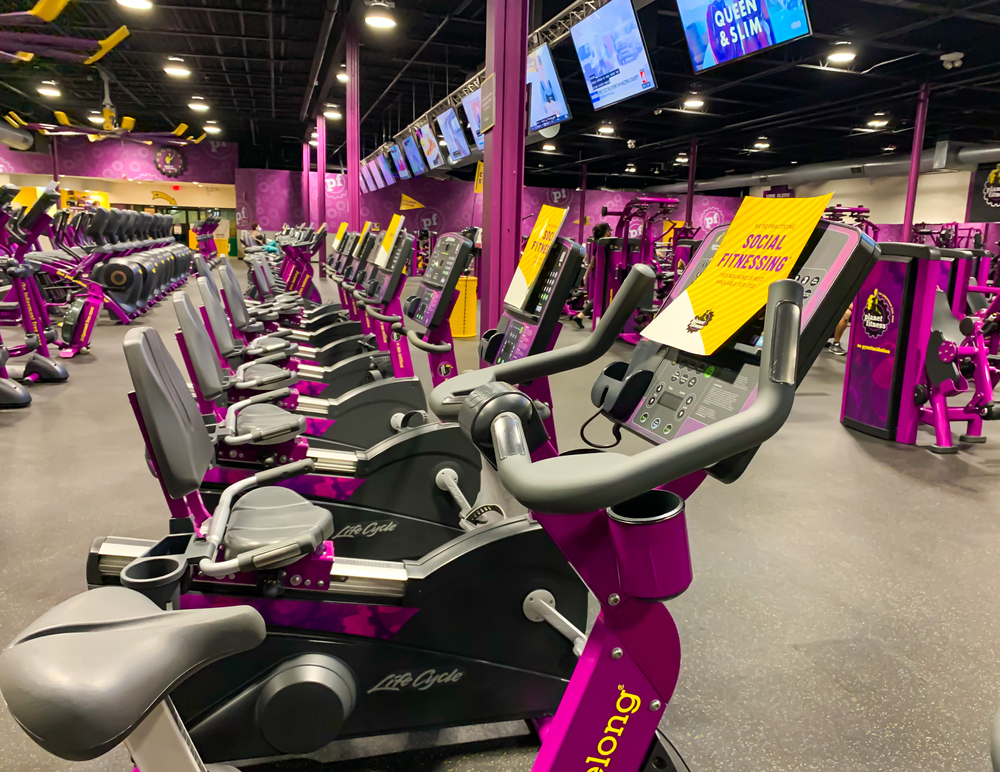Low-Cost Gyms Poised To Thrive Amid Rise of Weight Loss Drugs

The rise of GLP-1s will cause more people to seek gym memberships and could benefit the fitness industry in other ways, analysts predict
There has been a surge of interest in a new class of “GLP-1” medications for diabetes and weight loss, and the drugs’ popularity could greatly benefit the fitness industry, especially high-volume, low-price (HVLP) gyms like Planet Fitness.
According to analysts, GLP-1 medications will drive a surge in new gym joiners, cultivate the creation of in-house GLP-1 programs at fitness centers, and present a new demographic market for fitness trackers, apps and supplements.
The drugs are called GLP-1 (glucagon-like peptide 1) because they mimic the GLP-1 hormone which naturally occurs in the body that is released after eating; the medications help individuals to feel fuller for longer, reduce cravings and enhance the way the body regulates blood sugar levels, all of which can help patients lose weight. Clinical trials indicate that the drugs may help patients lose up to 15-20 percent of their body weight.
Athletech News highlights the potential implications of the rise of GLP-1 drugs for the fitness industry.
Key Insights:
- The anti-obesity medication (AOM) global market is estimated to reach between $77B to $100B by 2023, according to global financial firms. This presents a significant long-term opportunity for the fitness industry to reach a new demographic.
- There could be an influx of new gym memberships as GLP-1 medications help individuals lose weight.
- Gym and club operators such as Life Time are designing programs that offer GLP-1 programs for their members, collaborating with the medical community.
- There are growth opportunities for fitness and health trackers and apps as a tool for individuals to monitor health goals on their weight loss journeys.
- Supplements can be promoted to help ease GLP-1 medication side effects.
GLP-1s: A $100B Opportunity for the Fitness Industry
The anti-obesity medication market will be worth between $77B to $100B by 2030, according to analysts from global financial firms including Barclays Bank, Goldman Sachs and Morgan Stanley.
The analysts’ estimates are based upon several factors, most notably the total addressable population size, expansion for insurance reimbursement treatment and market growth. The World Health Organization estimates that more than one billion people are obese: 650 million adults, 340 million adolescents, and 39 million children. In the United States, 42.4% of Americans are obese, of which 9.2% are severely obese, according to the latest available data from the National Institute of Health and Nutrition Examination Survey (NHANES).
Surge in New Gym Members, Especially for Low-Cost Chains
GLP-1 medication usage may positively impact clients joining gyms, particularly new gym-goers. Evercore ISI, an equity research firm, referenced survey data where 39% of survey respondents reported they avoid going to the gym due to feeling self-conscious. Thus, the firm predicted that large-scale weight loss could help to uncork a surge in new gym joiners for the fitness industry. The firm estimated that individuals who are less than 200 pounds after taking GLP-1 medication represent the biggest new-member opportunity.
Evercore estimates that Planet Fitness, the popular HVLP franchise, will have a disproportionate positive benefit from GLP-1 medication usage due to the company’s “judgement free zone” philosophy and the company’s strong record with first-time gym members. Forty percent of Planet Fitness members each year are new to fitness clubs. Evercore ISI estimates that GLP-1 medication usage could drive over one million new members for Planet Fitness by 2025.
Gyms & Clubs To Offer In-House Weight Loss Programs
There are opportunities for gym and club operators to offer GLP-1 programs for members, particularly those that offer high-end, boutique-style, fitness and wellness offerings.
Life Time, a luxury fitness provider with 170 centers, announced that it is considering a comprehensive in-house GLP-1 program for its members.
Jeff Zwiefel, Life Time president and chief operating officer, told CNBC that the company is in the process of embarking on a pilot program to evaluate the “use and deployment of physicians, physician assistants and nurse practitioners” that would work together with a member’s primary care doctor and Life Time’s personal trainers and registered dieticians. He added that the program would include blood-panel analysis and recognize the FDA requirements for increased physical activity in conjunction with the medication.
Growth Opportunity for Fitness Trackers & Apps
As individuals are on weight loss journeys, there are growth opportunities for fitness trackers and apps, such as a FitBit, Samsung Galaxy Smart Watch, Apple Watch and Apple Health, to monitor health. Individuals may also be interested in a variety of options depending on weight loss progression and individual goals and preferences. As individuals make changes to their lifestyles, health and fitness trackers can help them keep track of a wide range of options – given that some will become more important as they are on the medication and others after they stop taking the medication.
Individuals may be very interested in monitoring glucose levels, heart rate, observing dosage side effects, monitoring nutrition, tracking fitness activity and participating in community chat groups. As weight gain may occur after stopping medication, fitness trackers and apps are tools to help individuals monitor their health, fitness and weight loss goals.
Digestive Supplements Can Ease Side Effects
Some of the reported side effects of the GLP-1 medications include nausea, vomiting and diarrhea. The medications include the ingredient, semaglutide, and the drugs work both by suppressing the appetite and helping to slow the movement of food through the body. Therefore, individuals may find some relief through supplements and over the counter medicines, according to analysts from Barclays. For example, consumers may seek out probiotics products that can help to ease digestion and other supplements to support a healthy lifestyle.



